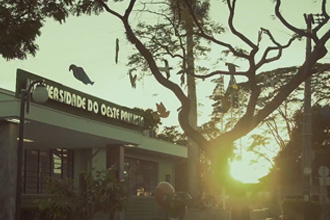Graduate Program in Health Sciences
INTRODUCTION
The Graduate Program in Health Sciences welcomes the participation of physicians and non-physician professionals. The research lines focus on pathophysiology of infectious and chronic diseases understanding, especially those related to regional specificities. The studies include experimental and clinical investigations in many areas of health sciences, evidencing a multidisciplinary approach to the prevention, diagnostic and interventionist phases of the diseases. The program aims to improve the scientific and technological development. The program, therefore, enables the graduate students to practice teaching and research, and thus facilitates the process of knowledge propagation, and formation of new research lines in different areas of Health Sciences.
Suitable for: Professionals from different areas of Health Sciences
Area of concentration: Health Sciences

RESEARCH LINES
I – INFECTIOUS AND PARASITIC DISEASES
Overview: Studies of the main infectious and parasitic agents with special emphasis on the regional context: approach to epidemiological, clinical and laboratory aspects parasite insect vectors and reservoirs of sanitary and socioeconomic importance; Immunobiological aspects of the parasite-host-environment relationship; Investigation of mechanisms through experimental studies and potential therapeutic agents, utilizing computational studies of target / binder interactions.
Related Faculty:
- Daniela Vanessa Moris
- Eliana Peresi Lordelo
- Lizziane Kretli Winkelströter Eller
- Luiz Euribel Prestes Carneiro
- Marilda Aparecida Milanez Morgado de Abreu
- Valéria Cataneli Pereira
- Vamilton Alvares Santarém
Collaborating Professors:
- Marcus Vinicius Pimenta Rodrigues
- Rogéria Keller
II – CHRONIC DISEASES AND HEALTH INJURIES
Overview: Studies on morphofunctional, molecular and tissue changes related to the pathophysiology of chronic non-infectious diseases, with emphasis on cardiovascular, respiratory, muscular and bone, reproductive, mental and neoplastic dysfunctions, involving studies with clinical samples, animal experimentation and image analysis; Morphofunctional adaptations and metabolic interactions, with the application of interventional practices; Diagnostic processes and risk factors related to these diseases on different tissues.
Related Faculty:
- Francis Lopes Pacagnelli
- Gisele Alborghetti Nai
- Hamilton Mitsugu Ishiki
- Renata Calciolari Rossi e Silva
- Wilson Romero Nakagaki
Collaborating Professors:
- Ana Clara Campagnolo Real Gonçalves
FACULTY´S EMAIL AND RÉSUMÉ
-
Daniela Vanessa Moris (danimoris@unoeste.br)
http://buscatextual.cnpq.br/buscatextual/visualizacv.do?id=K4119365Z9&idiomaExibicao=2 -
Eliana Peresi Lordelo (elianaperesi@unoeste.br)
http://buscatextual.cnpq.br/buscatextual/visualizacv.do?id=K4778692Y2&idiomaExibicao=2 -
Francis Lopes Pacagnelli (francispacagnelli@unoeste.br)
http://buscatextual.cnpq.br/buscatextual/visualizacv.do?id=K4710116H8&idiomaExibicao=2 -
Gisele Alborghetti Nai (patologia@unoeste.br)
http://buscatextual.cnpq.br/buscatextual/visualizacv.do?id=K4137786D6&idiomaExibicao=2 -
Hamilton Mitsugu Ishiki (hamilton@unoeste.br)
http://buscatextual.cnpq.br/buscatextual/visualizacv.do?id=K4792061U3&idiomaExibicao=2 -
Lizziane Kretli Winkelströter Eller (lizziane@unoeste.br)
http://buscatextual.cnpq.br/buscatextual/visualizacv.do?id=K4264513A8&idiomaExibicao=2 -
Luiz Euribel Prestes Carneiro (luiz@unoeste.br)
http://buscatextual.cnpq.br/buscatextual/visualizacv.do?id=K4779268H1&idiomaExibicao=2 -
Marilda Aparecida Milanez Morgado de Abreu (marilda@unoeste.br)
http://buscatextual.cnpq.br/buscatextual/visualizacv.do?id=K4746738Y6&idiomaExibicao=2 -
Renata Calciolari Rossi e Silva (renatacalciolari@terra.com.br)
http://buscatextual.cnpq.br/buscatextual/visualizacv.do?id=K4757587U8&idiomaExibicao=2 -
Valéria Cataneli Pereira (valeriapereira@unoeste.br)
http://lattes.cnpq.br/3751249080713020 -
Vamilton Alvares Santarém (vamilton@unoeste.br)
http://buscatextual.cnpq.br/buscatextual/visualizacv.do?id=K4706661Y7&idiomaExibicao=2 -
Wilson Romero Nakagaki (wilromero@unoeste.br)
http://buscatextual.cnpq.br/buscatextual/visualizacv.do?id=K4730670E2&idiomaExibicao=2
Collaborating Professors:
-
Ana Clara Campagnolo Real Gonçalves (anaclara@unoeste.br)
http://buscatextual.cnpq.br/buscatextual/visualizacv.do?id=K4267370H9&idiomaExibicao=2 -
Marcus Vinicius Pimenta Rodrigues (marcusvinicius@unoeste.br)
http://buscatextual.cnpq.br/buscatextual/visualizacv.do?id=K4745363T1&idiomaExibicao=2 -
Rogéria Keller (rogeriakeller@unoeste.br)
http://buscatextual.cnpq.br/buscatextual/visualizacv.do?id=K4728007A1&idiomaExibicao=2
CURRICULAR STRUCTURE AND COURSES
The Graduate Program in Health Sciences has a Curricular Structure with a workload of 1,440 hours (corresponding to 96 credits) distributed in thematic axes of studies with compulsory and elective courses, plan of activities, complementary activities, research activities, general qualification examination, and the development and presentation of Master dissertation, distributed as follows: Compulsory Courses: 8 credits (3 courses); Elective Courses: 12 credits (4 to 6 courses); Elaboration and defense of a Master dissertation: 66 credits; Complementary Activities: 10 credits. Deadlines: The term for Dissertation defense is at least 12 months and a maximum of 24 months.
Compulsory Courses:
Biostatistics (2 credits)
Methodology and Ethics in Scientific Research (2 credits)
Special Topics in Health (4 credits)
Elective Courses:
Pharmacogenetics of Leishmaniasis (2 credits)
Host-parasite interaction in microbial infections (3 credits)
Mycobacterioses in the regional context: clinical approach / epidemiology and immunology (3 credits)
Medicinal Chemistry (2 credits)
Intervention proposals for prevention, promotion and rehabilitation of cardiovascular disorders (3 credits)
Psychopharmacology of mood disorders: scientific evidence and clinical management (3 credits)
Extracellular matrix (Normal and pathological aspects) (2 credits)
Environmental toxicology: impacts on the health of exposed population (2 credits)
Basic Education (2 credits)
Immunopathology of prematurity (2 credits)
GROUPS AND RESEARCH CENTERS
Ana Clara Campagnolo Real Gonçalves
Leader of the CNPq Research Group: "Exercise Physiology"
Member of the CNPq Research Group: "Research Group on Physical Activity and Public Health (GEPASP)"
Ana Paula Alves Favareto
Leader of the CNPq Research Group: "Toxicology of Reproduction and Development"
Member of the CNPq Research Groups: "General pathological processes in organs and systems: epidemiological and clinical-morphological aspects" and "Clinical-epidemiological aspects of infectious-parasitic diseases"
Daniela Vanessa Moris
Leader of the CNPq Research Group: "Microbiological aspects of infectious diseases"
Member of the CNPq Research Group: "Systemic mycoses" and "Medical Microbiology"
Eliana Peresi Lordelo
Leader of the CNPq Research Group: "Clinical-epidemiological aspects of infectious-parasitic diseases”
Member of the CNPq Research Groups: "Medical Microbiology" and “GRUPOU - Research Group on Dentistry at UNOESTE”
Francis Lopes Pacagnelli
Leader of the CNPq Research Group: "Morpho-functional and physiological aspects of cardiorespiratory, metabolic and locomotor systems"
Gisele Alborghetti Nai
Vice-Leader of the CNPq Research Group: "Research in Clinical Medicine, Pathology and Immunology"
Luiz Euribel Prestes Carneiro
Leader of the CNPq Research Groups: "Study on infectious diseases with emphasis on pathology and immune response" and "Tropical parasitic zoonosis
Member of the CNPq Research Group: "Metabolism and Molecular Biology applied to exercise and endocrine disorders"
Marilda Aparecida Milanez Morgado de Abreu
Member of the CNPq Research Group: "Research in Clinical Medicine, Pathology and Immunology"
Renata Calciolari Rossi e Silva
Leader of the CNPq Research Group: "General pathological processes in organs and systems - epidemiological and clinical morphological aspects"
Vamilton Alvares Santarém
Leader of the CNPq Research Group: "Tropical parasitic zoonoses in domestic animals and their transmitting agents"
Member of the CNPq Research Groups: "Bacterial diseases and tropical zoonoses in production and company animals" and "Zoonoses and Public Health"
Wilson Romero Nakagaki
Member of the CNPq Research Group: “Plasticity and regeneration” Laboratory of Bone Tissues, Department of Structural and Functional Biology/Anatomy
Marcus Vinicius Pimenta Rodrigues
Leader of CNPq Research Groups: "Microbiological aspects of infectious diseases" and "Medical Microbiology" (UNOESTE)
Member of the CNPq Research Groups: "Morphofunctional aspects of inflammatory alterations", "General pathological processes in organs and systems: epidemiological and clinical-morphological aspects", "Biology of microorganisms of medical interest" and "Molecular biology of microorganisms”
ADMISSIONS
Candidates may submit an application or fill out a prospective form online for further contact from the University.
MAIN RESEARCH PROJECTS
“Cryptococcal antigenemia in HIV-infected patients with severe immunosuppression”. Professor: Daniela Vanessa Moris
“Evaluation of the effects of exposure to pesticides on reproduction morphology and development”. Professor: Ana Paula Alves Favareto
“Influence of isodynamic training on the metabolic, functional and quality of life parameters in women with cardiovascular risk factors at UBS (Health Basic Unity)”. Professor: Francis Lopes Pacagnelli
“Effect of Bidens pilosa on jaundice hepatotoxicity and mutagenicity” and “Influence of water pH on the effects of cadmium intoxication: an experimental study in rats” Professor: Gisele Alborghetti Nai
“Computational study of molecular interactions between sulforaphane and isoenzimapyruvatoquinase M2 (PKM2): a potential target against cancer”. Professor: Hamilton Mitsugu Ishiki
“Epidemiology, clinical aspects and treatment of patients with visceral Leishmaniasis at a tertiary hospital in Presidente Prudente, SP”. Professor: Luiz Euribel Prestes Carneiro
“Epidemiological, clinical, laboratory, therapeutical and evolutionary profile of patients with hansenic reactions assisted at the Presidente Prudente Regional Hospital”. Professor: Marilda Aparecida Milanez Morgado de Abreu
“Zoonoses caused by geoparasites in the Pontal do Paranapanema region: prevalence, risk factors, social and environmental impacts”. Professor: Vamilton Alvares Santarém
“Influence of the use of combined therapy on body composition and autonomic behavior of overweight women”. Professor: Ana Clara Campagnolo Real Gonçalves
“Morphological evaluation of respiratory epithelium in experimental models submitted to spraying of agricultural pesticides”. Professor: Renata Calciolari Rossi e Silva
“Effects of alcoholism and smoking on the osteoarticular system”. Professor: Wilson Romero Nakagaki
“Evaluation of the colonization by Staphylococcus aureus in professionals of health units of a municipality of the Western São Paulo region”. Professor: Valeria Cataneli Pereira
“Ecology and physiology of microorganisms involved in the formation of biofilms: detection and control of pathogenic and foodborne bacteria”. Professor: Lizziane K. Winkelstroter Eller
POST DOCTORAL POSITIONS
The Graduate Program in Health Sciences receives Ph.D. professionals for postdoctoral internships. Applications should include a proposal containing: a pre-research project, a personal statement describing the applicant’s interest in the Health Sciences studies and career goals and a letter of recommendation from the researcher’s primary faculty advisor. The application should also indicate who would be the researcher’s program advisor, who must be a member of the program faculty.
Please submit your application or proposal to the addresses listed in the "CONTACT US" section.
VISITOR INFORMATION AND STUDENT LIFE
Founded in 1972, the University of Western São Paulo – UNOESTE is committed to building character, modeling values, and ensuring that students graduate with not only hands-on experience in their field of study, but also with the necessary life skills to be successful.
Rooted in the major areas of knowledge, UNOESTE is a private comprehensive institution with around 18,000 undergraduate and graduate students. Its mission is to provide educational experiences that enlighten, challenge, and prepare students to lead lives of significance in complex global communities, being recognized for the excellence of its academic programs, the depth of its values-based culture, and the breadth of its inclusiveness.
The city of Presidente Prudente is located in the western region of São Paulo State, and is recognized as presenting one of the highest HDI values in Brazil. In this city, every citizen receives extraordinary opportunities for high level education in an inspiring environment.
Although it is a modern and cosmopolitan city, it still maintains many aspects of a small inner city, where people are welcoming, willing to dialogue and mutual understanding, under excellent levels of public safety. In addition, the city has a recognized high cultural level, with theaters, cinemas, artistic and musical presentations, as well as excellent facilities for daily activities, such as an efficient transportation system, and a wide availability of department stores, shopping malls, recreational clubs, gardens and public parks.
Our responsibility is to help prepare students with the knowledge of how to live at the highest of their potential. As a member of our university community, we want you to know that we are committed to making your experience the best it can be.
CONTACT US
For more information, please contact:
International Cooperation Office (ICO)
Email: iaa@unoeste.br or contact@unoeste.br
Tel: +55 18 3229-3288
Fax: +55 18 3229-2080
Secretary - Graduate Program in Health Sciences
E-mail: cs@unoeste.br or joyce@unoeste.br
Tel: +55 18 3229-3264
Tel: +55 18 3229-2000 Internal extension: 2132
At.
Dean of Research and Graduate Studies
University of Western São Paulo – UNOESTE - Campus II
Rodovia Raposo Tavares, km 572
CEP 19.067-175 Presidente Prudente (SP)
BRAZIL








